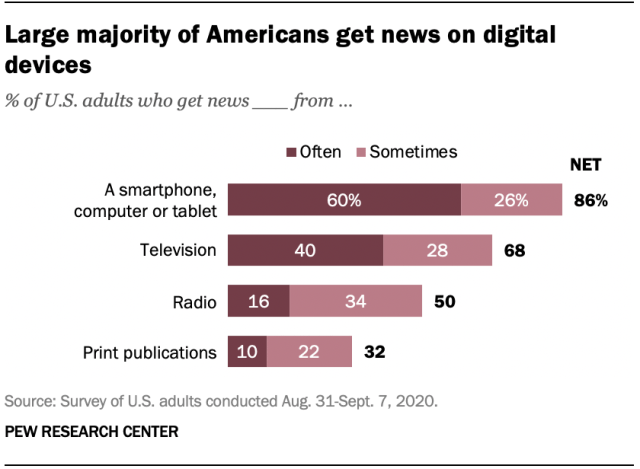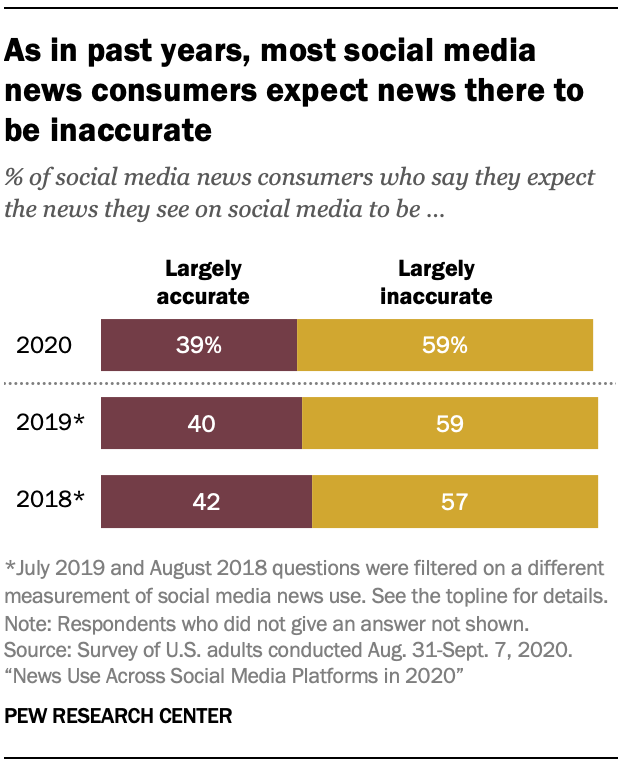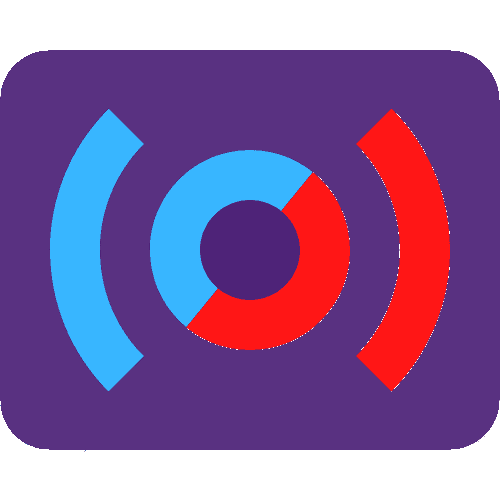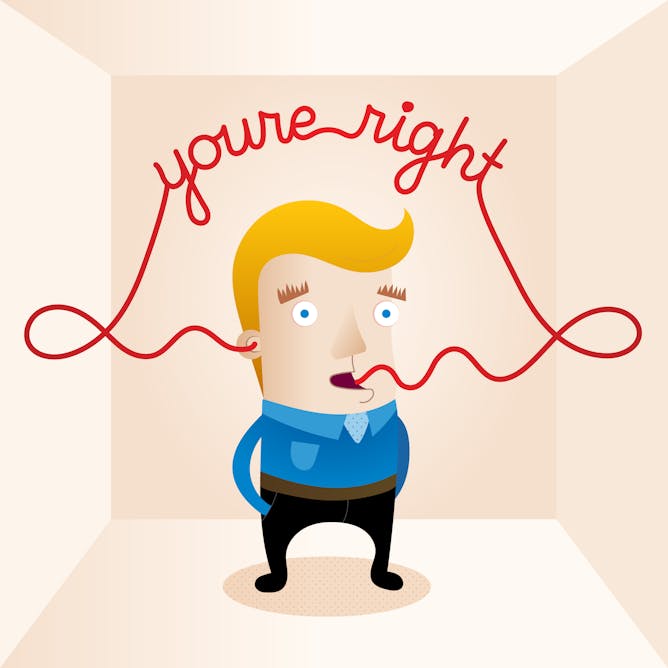Echo Chambers: how they happen and who's to blame?
John Grisham

Sep 1st 2021
Are you living in an echo chamber? We will examine what echo chambers/filter bubbles are, how they happen, and who's to blame for them happening so often. "Echo chamber" is a term that gets thrown around but oftentimes this phrase is misunderstood or taken out of context.
"You can't believe everything you see on the internet."
This is a phrase that many people, especially those who grew up in the early 2000s, have heard from their parents. The reasons for this are many. But two phrases that are being used to describe it are "echo chamber" and "filter bubble." But what is an echo chamber? Do echo chambers exist? Or is it just an exaggeration to explain the polarization we're experiencing in the real world? And just who should be responsible for alleviating the harm they cause? Let's take a look at some of these questions and the effects echo chambers might have on our daily lives as U.S citizens and voters.
Some common claims
For reference, I will be using the terms echo chambers and filter bubbles interchangeably. Here are 5 general claims being made about echo chambers on the internet.
- Echo chambers are bubbles that exist online and prevent the user from seeing past their own opinion.
- Echo chambers have been called a "modern-day threat to democracy" by some who argue that they're ultimately harming our ability to think critically about what we know since we tend to agree with viewpoints similar to our own.
- Echo chambers might also be hurting our real-world relationships and not just impacting our online social media feeds.
- Filter bubbles reinforce political bias especially regarding where we get facts and the sort of news we tend to draw our perspectives from.
- Echo chambers are made worse by social media which rewards the most divisive content with engagement and virality.
What is an echo chamber?
First, what are echo chambers or filter bubbles exactly? An echo chamber is basically any environment where you can't see outside opinions or viewpoints from inside it. This will tend to be online with your Facebook feed for instance but they don't always exist online - if you only watch Fox News and not CNN then that would be an echo chamber too because there's no way for you to hear another perspective or opinion about something happening in the country right now unless someone else tells you about it (or perhaps via social media, assuming that bubble allows it).
Filter bubbles reinforce political biases in a way that might not be obvious to the individual. If you only get your info from conservative sources then chances are you'll never hear about something like climate change for example. Echo chambers may also have an effect on our real-world relationships as we begin shutting out people who don't share our opinions which can lead to arguments or worse yet, depression and loneliness.
How do echo chambers affect our daily lives?
So what does the research say? A data-science study by PNAS brings light to the idea of echo chambers in particular those on social media. The paper compared different social networks and the effect that they have on creating echo chambers. This was done using 100 million different pieces of content concerning controversial topics drawn from leading social platforms. Data sets were compared over two dimensions, homophily of user interaction (how likely users were to engage with users of similar beliefs) and how biased the dissemination of this content was between like-minded individuals. The conclusion of this study was that the segregation of users with different political views was significantly higher on platforms like Facebook which don't provide user tweakable feeds compared to those that do such as Reddit. This means that platforms that emphasize feeds have a higher tendency to categorize users via political bias.

If you can believe that it's possible for social media platforms to trap you in an online media echo chamber then you might ask what responsibility that social network has for actions you take based on what your feed prescribed. Is it more the fault of the algorithm or the individual? A common viewpoint held by mainstream media sources at this time is that social media fosters distrust in science. Results from a study published in SAGE journals actually find the opposite to be true. The study used data provided from surveys collected in 20 countries to discover the relationship between online media platforms and trust in science.
Respondents were asked to rate feelings toward actors/institutions and scientists/universities on a scale of 0–6 with Zero being "No Trust" and Six being "A Great Deal of Trust". Along with the question of trust they were also asked in which ways they used social media along 4 use cases. The study established a positive relationship between social media use and trust in science but with one major caveat. The quality of the information was not accessed which leaves room for trust in ill-informed science and misinformation. This means echo chambers could be harmful not only due to the misinformation we might consume but because of how much confidence people place in what they're being shown by Facebook, Google, Twitter, etc.
Who's to blame?
If echo chambers do exist then perhaps their presence explains why there's so little agreement between politicians these days when just decades ago bipartisan compromise seemed like something everyone was capable of achieving with enough effort. But we also have to ask the question of who is more at fault for echo chambers and polarization in politics? Is it the media for promoting divisive stories or pandering to their audiences? Is it social media platforms for spreading misinformation on mass and worsening confirmation bias through algorithms? Is it politicians who have drawn more partisan lines and can't seem to agree on anything? Or is it the fault of voters who consume spoon-fed articles given to them in an easy-to-read social media feed? Perhaps echo chambers can't account for all the political polarization we see today but they can't be dismissed either.
The role that the media plays
Let's first examine the role that the media plays in worsening these effects. There is a litany of news sources to choose from each with its own facts, opinions, and narratives. And just like the printing press of old media networks have the means to spread their news via the internet. In fact, media organizations have a more direct relationship with their readers than ever before as more news articles make their way online we are starting to see printed news fade from the forefront of the American news cycle.

Unfortunately, this means that echo chambers are becoming more and more prevalent because news outlets have to compete for clicks just like any other type of company. They're trying to feed their audience what they want in order to get the maximum possible viewership or readership (which equals ad revenue and paid subscriptions).
This has caused polarization of content as media outlets try pushing stories consistent with a specific narrative rather than reporting objective facts common across the political spectrum. For example, Fox News leans towards right-wing views while MSNBC leans leftward creating an effect where people only consume one perspective which makes it seem like no middle ground exists between those two extremes when sometimes there can be healthy discussion taking place somewhere in the middle. Some valid complaints made of the media include the cherry-picking of facts to support agendas or creating clickbait article headlines. These have always been problems that journalists and media outlets have struggled with historically. But these issues are only made worse with the introduction of networks like Twitter, Facebook, and similar social networks.
Another echo chamber effect is the lack of cross-network exposure. In recent years cable television news has lost viewers to online and social media outlets. Additionally, some people are starting to become more aware that they're getting information from a certain network or website which makes them less likely to trust what's presented in front of them because it might be biased towards one side or another just like we discussed earlier with Fox News and MSNBC.
How social media platforms make the problem worse
Social networks can exacerbate this problem by mainly promoting viewpoints to users that align with their own personal echo chamber wall. In addition to the burden of news diversity put on social networks they also have to contend with the spread of misinformation and fake news. Often times this information is shared through algorithms without context and when it receives enough attention people begin to see that story as the truth which can echo through other networks making it seem like a commonly accepted fact.
A good example of this was the Pizza Gate conspiracy theory rooted in fake news articles about Hillary Clinton running a child sex ring out of pizza restaurants around Washington D, C. This false narrative spread across multiple social media platforms for months until real events were twisted into more propaganda perpetuating these falsehoods even further eventually leading someone to storm one of those locations with an assault rifle looking to free what they considered captive children from sexual slavery.
The popular Netflix documentary The Social Dilemma examines topics that contribute to this problem. One such concern it addresses is the productization of users and segmentation of like-minded users for the purpose of increasing ad revenue. And of course the use of algorithms that maximize user engagement even at the risk of putting users into filter bubbles. Facebook in particular has this engagement model down to a science and has been under more scrutiny regarding the role the platform plays in disseminating vaccine misinformation. And while the social media giant has made some strides to reduce vaccine fears amongst its users, the platform has struggled to deal with the anti-vax internet communities that it provides sanctuary for.
While on the surface this distrust of Facebook is a good thing from the standpoint of preventing harmful misinformation from being interpreted as factual it presents another problem. This reduction of trust oftentimes erodes trust in the content as well as the platform and opens up space for other bubble re-enforcing digital spaces like Parlor hidden under the guise of free speech and anti-censorship. Not to mention that this mistrust doesn't change the type of content users ultimately get served through algorithms. All of this seems to indicate that Twitter and Facebook need to reassess their business models to mitigate this bubble effect and increase content exposure to other feeds.

Ok, let's blame politicians
We could also point the finger at politicians (An original idea I know) and say that political infighting amongst our government drives a wedge in our public discourse; furthering polarization. How much responsibility should they have for the thoughts and opinions their constituency share? An argument can even be made that this echo chamber effect benefits partisan politicians by helping further campaign narratives that drive voters to the polls. In fact, those types of politicians wouldn't want voters to have a broader view of the political spectrum. The problem isn't just on the side of conservative politicians either. More politicians have been taking cues from Trump and engaging with their supporters through social media.
Another echo chamber effect that politicians can have is with the media. Politicians are going to be interviewed by news sources and those interviews will produce articles which are then shared across social networks, creating a feedback loop of information where people read an article about something they agree or disagree with based on who it's from making them more likely to accept what was said without question regardless if it's true or not because "of course" their political opponents would lie.
This doesn't always mean that these echo chambers don't exist within specific groups either for example, there could be echo chambers among conservative voters in rural areas while liberal voters reside in cities believing different things than one another all due to their own confirmation bias. The key point here is that everyone has some echo chamber effect going on whether it's intentional or not.
Getting past our own confirmation bias
That brings us to the final contributor to the echo chamber problem, you and me. When our founders started this country they chose to have politicians represent people in part due to fears of being ruled by an uneducated population. That's why we hear so much about voter education every election cycle alongside claims from both sides that their opponent's supporters don't have all the facts. This role has traditionally been the role of journalists and the media but as facts shift and so many voters get their political news from social media we need to redefine what media literacy looks like.
The problem of online political echo chambers needs to be addressed from the top down for sure. One way we can do this is by holding social platforms (Twitter / Facebook) accountable for the polarization of users. And of course by continuing to hold journalists and politicians to standards that benefit voters and readers alike. But we also need to work from the ground up. Working within community programs and non-profits that empower the healthy public discourse that seems to be lacking these days. We need to be more vigilant when we find ourselves in digital spaces that could cause us harm. Toxic environments that prompt users toward like-minded groupthink. The types of platforms that care more about engagement and clicks than the effect they have on those users, good or bad. We need to be more critical of ourselves and focus on research over repost.
Conclusion
It can be easy to play the blame game when it comes to this topic and no doubt there is plenty of blame to be thrown around. However, echo chambers aren't just a conservative or liberal problem. It's an everyone problem and it affects us all in one way or another no matter where we fall on the political spectrum. They are a phenomenon ingrained in our media infrastructure, magnified by shares online, pontificated by politicians, and regurgitated by everyday citizens.
Instead of getting sucked into partisan bubbles why don't we strive to create systems that promote healthy dialogue, civil discourse, and exposure to new ideas. And finally, we must realize that as consumers of news we have a shared responsibility with those who produce it. We also must shift our focus from only what's being said in the article but why and how it was said in order to see the truth behind discussions taking place on the internet today, thus setting us free from media bubbles. We won't ever be able to solve divisive problems like climate change until we've figured out how to see our neighbor's opinion. In the end, this post isn't meant to say who is at fault really but how we all have a role to play in improving our media landscape and reducing the harm caused by echo chambers.
Sign up for the free newsletter to get this and more curated stories that will help you escape your media echo chamber.
You might also like...
